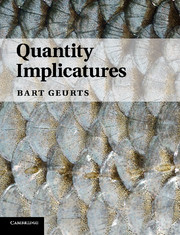Book contents
- Frontmatter
- Contents
- Preface
- Introduction
- 1 Gricean pragmatics
- 2 The Standard Recipe for Q-implicatures
- 3 Scalar implicatures
- 4 Psychological plausibility
- 5 Nonce inferences or defaults?
- 6 Intentions, alternatives, and free choice
- 7 Embedded implicatures: the problems
- 8 Embedded implicatures: a Gricean approach
- Afterword
- Notation and abbreviations
- References
- Index
2 - The Standard Recipe for Q-implicatures
Published online by Cambridge University Press: 04 February 2011
- Frontmatter
- Contents
- Preface
- Introduction
- 1 Gricean pragmatics
- 2 The Standard Recipe for Q-implicatures
- 3 Scalar implicatures
- 4 Psychological plausibility
- 5 Nonce inferences or defaults?
- 6 Intentions, alternatives, and free choice
- 7 Embedded implicatures: the problems
- 8 Embedded implicatures: a Gricean approach
- Afterword
- Notation and abbreviations
- References
- Index
Summary
Having surveyed the general framework of Gricean pragmatics, this chapter homes in on the variety of conversational implicatures we will be concerned with in the remainder of the book: quantity implicatures, or “Q-implicatures” for short (Horn 1984). Our starting point is what I call the “Standard Recipe” for deriving Q-implicatures. There are two reasons for calling it thus. First, the literature has by and large confined its attention to inferences that follow its pattern. Second, I suspect that in practice the Standard Recipe accounts for many if not most Q-implicatures associated with declarative sentences. However, standard though it may be, it doesn't cover everything that might justifiably be called a Q-implicature, even for declaratives.
The bulk of this chapter is devoted to fleshing out and amending the Standard Recipe, and this process will continue in the following chapters, where the amendments become more substantial. In fact, I will end up arguing that when push comes to shove the Standard Recipe gets things backwards: it has all the right ingredients, but fails to combine them in just the right way (Chapter 6). For the time being, however, we will be walking well-trodden paths.
The Standard Recipe
I will introduce the Standard Recipe by way of an example. Clyde says:
(1) Bonnie stole some of the pears.
On the classical Gricean account, (1) says that Bonnie stole at least some of the pears, and may implicate that she didn't steal all of them.
- Type
- Chapter
- Information
- Quantity Implicatures , pp. 27 - 48Publisher: Cambridge University PressPrint publication year: 2010



